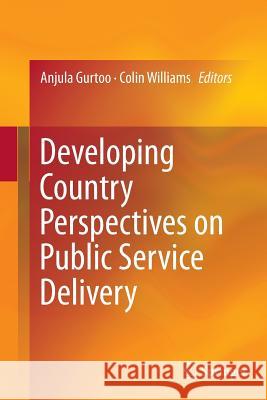Developing Country Perspectives on Public Service Delivery » książka



Developing Country Perspectives on Public Service Delivery
ISBN-13: 9788132229117 / Angielski / Miękka / 2016 / 293 str.
Developing Country Perspectives on Public Service Delivery
ISBN-13: 9788132229117 / Angielski / Miękka / 2016 / 293 str.
(netto: 191,66 VAT: 5%)
Najniższa cena z 30 dni: 192,74
ok. 22 dni roboczych.
Darmowa dostawa!
The book examines the status of public service in developing countries, in the sectors of health, infrastructure, labour and marginalized populations, rural economy and public administration.
Section I. Public Health: Assessing and Monitoring Performance.- Chapter 1: Access to Medicines in Indian Public Hospitals and Management Issues (by Satarupa Bandyopadhyay, Arijita Dutta, Arpita Ghose).- Chapter 2. Reproductive Health Services in Ethiopia (by Rajib Dasgupta, Narendra Kumar Arora, Damen Haile Mariam, Solomon Kumbi Hawas, Sanjay Chaturvedi, Ashok Patwari, Kalyan K. Ganguly).- Chapter 3. Analysing the 2011 Columbian Health Reforms (by Oscar Bernal, Juan C. Forero).- Chapter 4. Policy reform and governance in Philippine health regulatory system (by Maria Clarisa R. Sia, Oscar P. Ferrer).- Section II. Infrastructure: Development and Delivery.- Chapter 5. Technology Diffusion: Case of Cloud Computing in India (by Ajith Kumar Vasudevan, Anand Kumar, R. K Mittal).- Chapter 6. Unlocking Public Service Delivery Impediments for SMEs: Case of Fiji (Salvin S. Nand).- Chapter 7. Urban Mobility Trends in Indian Cities and its Implications (Ashish Verma,S. Velmurugan, Sanjay Singh, Anjula Gurtoo, T.V. Ramanayya, Malvika Dixit).- Chapter 8. Water Security: Assessing the Role of Reforms Related to Independent Regulatory Authorities in India (by Subodh Wagle, Sachin Warghade, Tejas Pol, Mandar Sathe).- Section III. Administrative Capacity and Performance.- Chapter 9. Professionalization of the Medical Profession in the Russian Federation (Daria Prisyazhnyuk).- Chapter 10. Perceived Quality of Public Administration and Trust in Government Officials of the Philippines (Joseph J. Capuno, Maria Melody S. Garcia).- Chapter 11. Legal basis for Responsible Working of the Administration in the Republic of Macedonia (Jadranka Denkova).- Chapter 12. Accountability in the Karnataka State Police in India (Meena Nair, K. Prabhakar, Prarthana Rao).- Section IV. Rural and Marginalized Populations: Reach and Execution.- Chapter 13. Housing for orphans against the backdrop of social disparity in Russia (Sergey Vinkov).- Chapter 14. The Role of Agricultural Public Extension in a Private Led Technological Innovation (RDT Baconguis, Linda Penalba, D. Elazegui and E. Dumayas).- Chapter 15. Implementing a Cash Grant Program for the Homeless in Metro Manila, the Philippines (Ada Aquino-Colico, Jungbu Ki).- Chapter 16. Enhancing Credit Delivery Facilities to Support Farmer’s Use of Technology (Linda M. Peñalba, Merlyne M. Paunlagui).- Chapter 17. Conclusion: Public Service Delivery - Emergent Essentials (Anjula Gurtoo, Colin c. Williams).
Anjula Gurtoo is an Associate Professor at the Indian Institute of Science, Bangalore, India. Her research interest is in the area of public policy, have published in the area of institutional reforms and decentralization, urban infrastructure, informal entrepreneurship, rural economy and energy and environment. She has been a fellow of the Social Science Research Council, New York and of the University of Leeds, UK. Her recent awards include: Pt. Jawaharlal Nehru National Award (2010-2012) for outstanding contribution in the field of Public Policy and Social Science, awarded by the Department of Science and Technology, Government of Madhya Pradesh, India, and Social Science Research Award (2009) by International Development Research Centre, Canada – Special mention for overall contribution to research and also for best paper in the category 'rural innovation systems'.
Colin Williams is a Professor of Public Policy, at the Management School, and Director of The Interdisciplinary Centre of the Social Sciences, University of Sheffield, UK. Colin's broad research interests are in re-theorising the nature of economic development and investigating the implications for public policy. Spatially, his interests range across the full spectrum from local and regional economic development in the UK through to the restructuring of western economies, post-socialist societies and the third (majority) world. Much of his work focuses upon rethinking the meanings of 'economic' and 'development,' which directly feeds into the work of the Centre for Regional Economic and Enterprise Development (CREED), University of Sheffield, UK. Colin currently serves as Editor of two journals – The International Journal of Sociology and Social Policy and the International Journal of Community Currency Research. Some books authored by him are: Rethinking the Future of Work: Directions and Visions (Palgrave Macmillan, 2007), The Hidden Enterprise Culture: Entrepreneurship in the Underground Economy (Edward Elgar Pub, 2006), A Commodified World? Mapping the Limits of Capitalism (Zed Books, 2005) and Cash-in-Hand Work: The Underground Sector and the Hidden Economy of Favours (Palgrave Macmillan, 2004).
The book examines the status of public service in developing countries, in the sectors of health, infrastructure, labour and marginalized populations, rural economy, and public administration. The last decade has witnessed significant government focus on service delivery in developing nations like South Africa, Philippines, India and Malaysia. At the forefront of this movement has been the public sector reforms significantly driven by two broad factors: public sector inefficiencies, and liberal economic ideology. This move towards efficient public service delivery in developing nations (versus developed nations) has required a significant shift in institutional thinking and institutional capacity for the governments. It is therefore no surprise that while economic liberalization has been relatively easy to implement, governance reforms towards public service delivery has been significantly more challenging. In this background, the chapters of the book, with sector themes, examine the three basic foundations of public policy—courses of action, regulatory measures and issues, and funding structures and priorities—in public service delivery. The book is a multi country, multi sector, perspective since it includes studies from Russian Federation, India, Ethiopia, Pakistan, Fiji, South Africa, Columbia, Philippines, Macedonia, and India. This perspective lends itself to the investigation for a comprehensive overall development model.
1997-2026 DolnySlask.com Agencja Internetowa
KrainaKsiazek.PL - Księgarnia Internetowa









